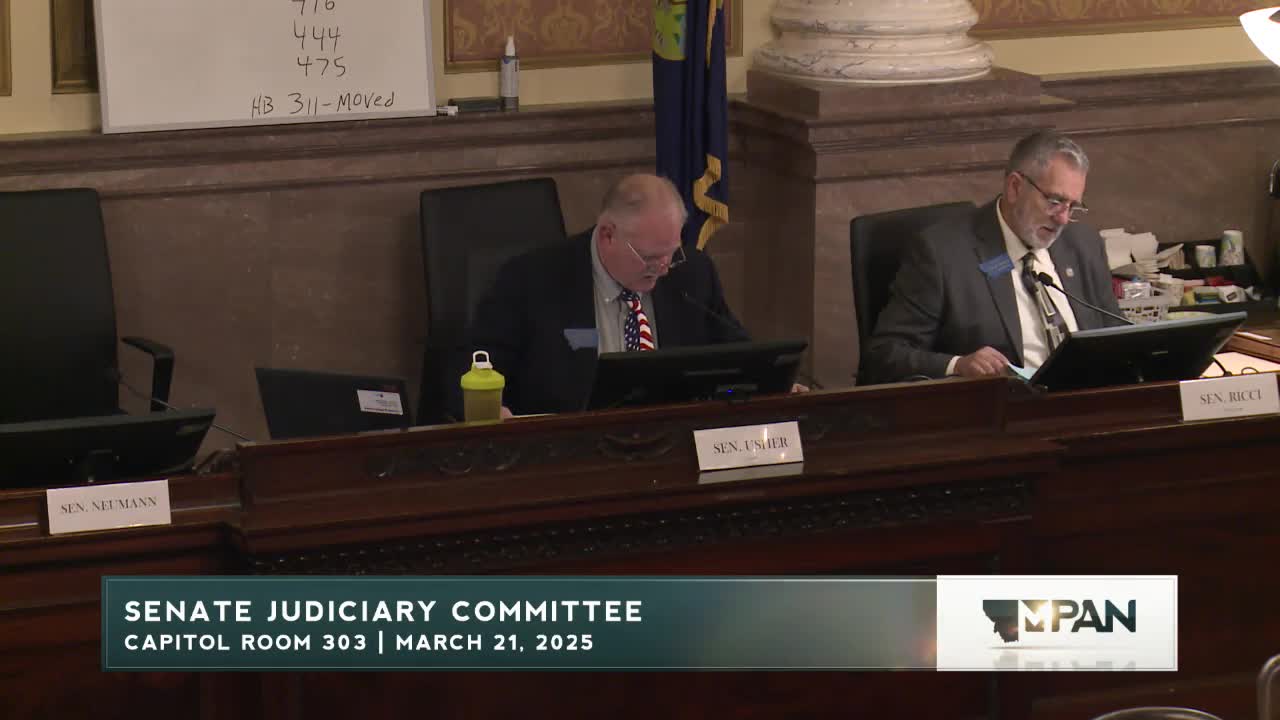Montana hearing spotlights clash over state school trust water rights and sale of isolated trust land
Get AI-powered insights, summaries, and transcripts
Subscribe
Summary
Members of the Montana Senate Judiciary Committee heard more than two hours of testimony on House Bill 676 on a contested set of changes that would limit when the state can assert an ownership interest in water rights used in connection with state school trust lands and would allow sale of some "landlocked" or isolated trust parcels.
Members of the Montana Senate Judiciary Committee heard more than two hours of testimony on House Bill 676 on a contested set of changes that would limit when the state can assert an ownership interest in water rights used in connection with state school trust lands and would allow sale of some "landlocked" or isolated trust parcels.
Sponsor remarks and proponents said HB 676 would protect private property and encourage investment on state-leased land. "This bill provides much needed clarity on state ownership of water rights," said Jocelyn Cahill, testifying for the Senior Ag Water Rights Alliance and identifying herself as a rancher in Broadwater County. "By explicitly stating that both the place of use and the place of diversion must be on state lands, this bill removes ambiguity."
The bill’s sponsor told the committee three changes are proposed: to disallow the Board of Land Commissioners from claiming private water rights that are used on state land but diverted from points off state land; to address maintenance/compensation questions tied to leases; and to permit sale of truly inaccessible, landlocked parcels of state trust land, with the sponsor saying sale proceeds could be dedicated to property tax relief or education.
Opponents ranged from the lieutenant governor, who spoke for Governor Greg Gianforte in his capacity as chair of the State Land Board, to school, conservation and water-rights groups. Lieutenant Governor Kristen Juras handed out a packet and argued the state is not "stealing" rights but acts under established water-right law and the trust’s fiduciary duty to beneficiaries. She outlined the basic elements of a water right — appropriation, beneficial use and a defined place of use — and said where a lessee acted as an agent on trust land the trust may have an interest that must be administered for schools.
Groups opposing the bill raised four consistent legal and practical concerns: that an arbitrary cutoff or carve-out could disrupt the ongoing statewide water adjudication and the Montana Water Court’s process; that ending or weakening adjudication risks federal complications tied to the McCarran Amendment and federal claims; that allowing non‑competitive sales or preference sales of trust land could violate constitutional mandates that trust sales secure full market value for beneficiaries; and that selling productive grazing or farm land could remove long‑term revenue and public access. "This is a system and a process we set in place many decades ago," said Brian Thompson of the Senior Water Rights Coalition. "We should allow it to complete its work."
Speakers representing public‑education coalitions, outdoor‑recreation groups and wildlife organizations warned the bill’s Section 11 — which opponents said would permit non‑competitive sales of certain isolated parcels at a lessee’s request — could lead to long‑term revenue loss, reduced public access and legal challenges. "The sale of state lands, even isolated parcels, represents a one‑time influx of funds. Once these parcels are sold, the state loses a potential ongoing revenue from leases and other uses of these lands," said Doug Reisig of the Coalition of Advocates for Montana’s public schools.
Witnesses from the Department of Natural Resources and Conservation (DNRC) provided technical context. Ryan Weiss, deputy administrator for state trust lands at DNRC, described classification and lease practices and said some isolated parcels can be a single 640‑acre section; he said retained land typically contributes perpetual value, with the permanent fund averaging roughly 3% annual distributions while agricultural lands have market appreciation. Anna Pakenham Stevenson, DNRC Water Resources Division administrator, was available for technical questions about adjudication and water‑use law.
Committee questions focused on maintenance responsibilities for wells, how dual‑use wells are handled, the legal basis for state claims when water diversion points are off trust land, and the scope and definition of "isolated" or "landlocked" parcels. The lieutenant governor and DNRC witnesses explained that where the point of diversion is on private land the private owner typically owns and maintains the well; where the point of diversion is on trust land, the trust has legal title as trustee and may need to secure compensation if a lessee installs improvements.
The committee did not take a final vote on the bill during the hearing. Supporters said they are preparing amendments and the sponsor indicated a willingness to work on definitions or to consider striking the sale section; opponents urged tabling or delaying action until the adjudication process and possible constitutional issues are further vetted.
Why it matters: HB 676 seeks to change how the state and private users interact over water used on trust lands and to allow sales of some trust parcels. The outcomes could affect agricultural investment, school trust revenues and public access — and could prompt litigation over adjudication and constitutionally required trust‑sale procedures.
The hearing record includes extensive sworn testimony from producers, water‑rights groups, school‑funding advocates, conservation organizations and DNRC staff. The committee closed the hearing without scheduling a final vote, and witnesses indicated negotiations and amendment work remain ongoing.
